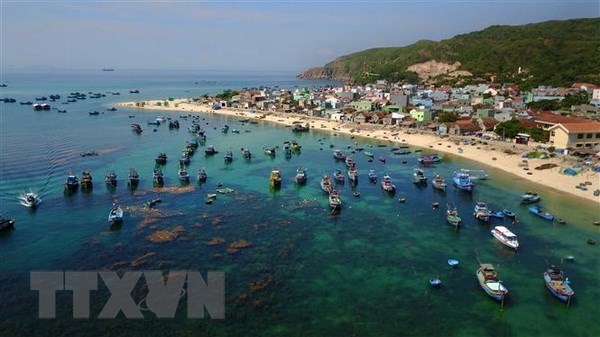Appropriate policies needed for blue sea economic development
Appropriate policies and regulations will help fully exploit untapped potential for developing blue sea economy, which plays an important role in socio – economic development of Vietnam, according to insiders.
One of challenges to ocean management is how to promote the benefits of sustainable development goals from the marine realm.
According to Dr. Ta Dinh Thi, vice chairman of the National Assembly's Committee on Science, Technology and Environment, and former director of the Vietnam Administration of Seas and Islands (VASI), Vietnam's marine economic development is still unsustainable and not harmoniously linked with social development and environmental protection.
Serious pollution and environmental incidents have been still reported from some waters and coastal areas, while plastic waste pollution has become an urgent problem, he said, adding that Vietnam is also facing imbalanced maritime ecosystem, degrading biodiversity and unrational exploitation of marine resources.
Besides, Vietnam’s marine science and technology resources remain limited, while businesses meet difficulties in accessing new production technologies due to high costs.
These factors make the exploration and exploitation of marine resources remain limited.
On the basis of the need for sustainable development of the national marine economy, Vietnam has issued Resolution No. 36-NQ/TW dated October 22, 2018, on strategy for sustainable development of marine economy to 2030, with a vision to 2045.
Under the resolution, attention has been paid to promoting sustainable development of marine economy on the basis of blue growth, conservation of biodiversity and marine ecosystems; ensuring the harmony between economic and natural ecosystems, conservation and development, the interests of coastal and land-locked localities; strengthening linkage and restructuring industries towards improving productivity, quality, efficiency and competitiveness; tapping potentials and advantages of the sea to create motivations for the national economic development.
The resolution also clearly states the goal of sustainable marine economic development by 2030, in which pure marine economic sectors will make up about 10% to the country's GDP. The economies of the 28 coastal cities and provinces are estimated to account for 65-70% of GDP, while the marine economic sectors will see sustainable development according to international standards.
The resolution also sets out “breakthroughs”, focusing on perfecting the institution for sustainable development of the marine economy; integrating and unifying the management mechanism for developing sea economy; promoting science and technology development and training high-quality marine human resources; and developing concerted infrastructure, and transport networks connecting major economic centres of the country, industrial parks, urban areas, coastal areas and seaports.
Assoc. Prof. Dr Nguyen Chu Hoi, vice president of the Vietnam Fisheries Society, said that the development of the blue sea economy requires continued institutional reforms such as building a marine economic development plan on the basis of blue sea economic development mindset in order to determine basic and long-term orientations for exploiting marine resources, protecting marine environment, and ensuring the sustainable development of marine economic sectors.
He emphasised the need to have consistency in the management of the marine economic development among ministries, sectors and central and local management agencies; and speed up the establishment of information systems on maritime resources and environment.
Blue sea economic development is an important orientation among the socio-economic development activities of the country. In order to achieve higher goals such as the country’s commitment to become a carbon neutral nation by 2050, Vietnam needs to make good use of the opportunities to both sustainably develop the marine economy and protect marine resources for future development.

